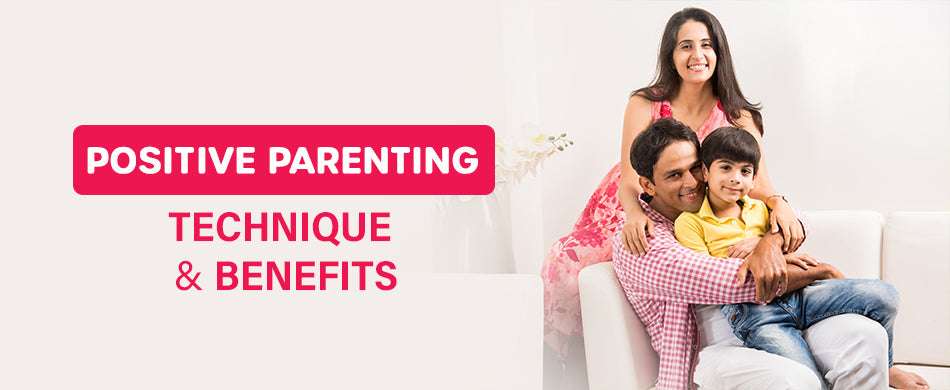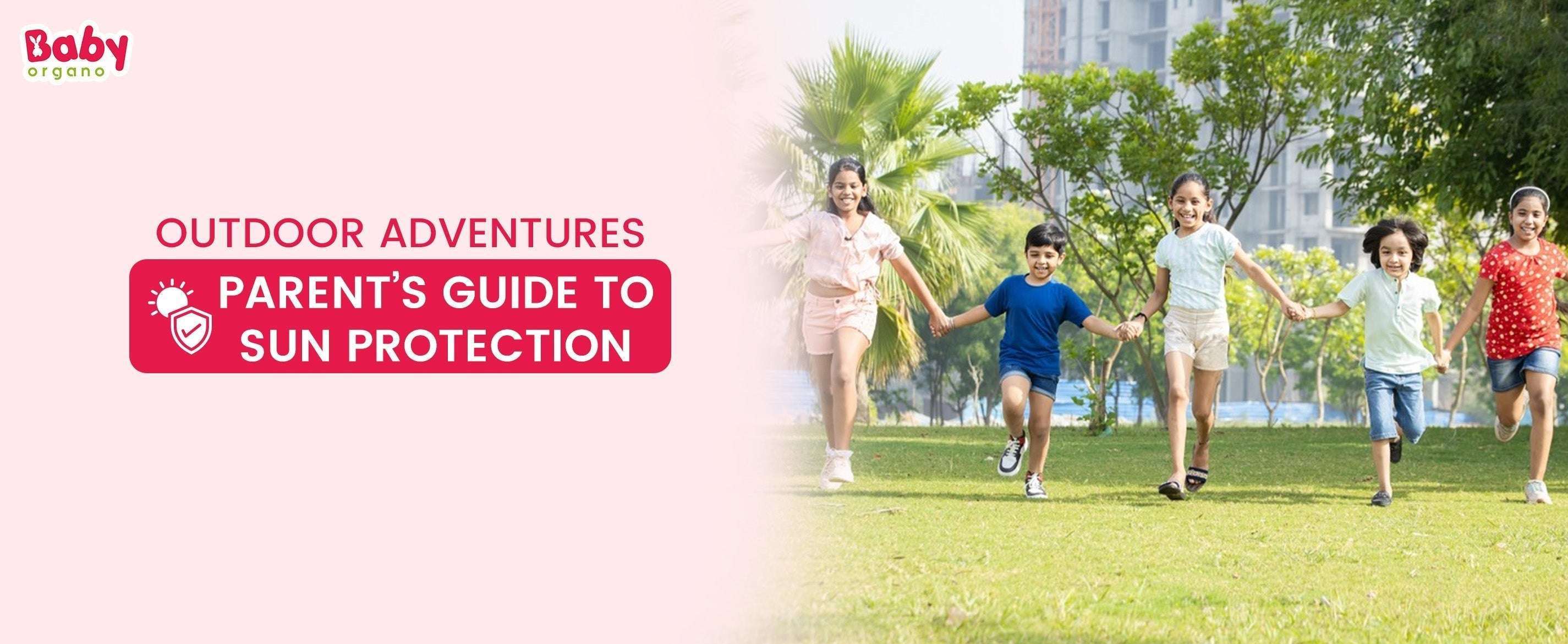Positive Parenting: Technique and Benefits
- by Baby Organo

People believe parenting is one of the hardest tasks in life, and success isn't always evident. Without a clear guide, every choice feels like a delicate balance that requires constancy, kindness, and care.
Even though things are uncertain, good parenting is a bright light that gives people hope. It takes a holistic approach to child and parent health and safety.
Positive parenting is a lifestyle that improves child behaviour and strengthens parent-child ties. Make good daily choices for yourself and help your family understand, care for, and appreciate each other.
Positive parenting creates a pleasant family life where love, support, and encouragement are present in every interaction. Additionally, using Ayurvedic Products for Babies to care for your child's skin is a positive parenting practice. It is a voyage of strength, growth, and unlimited opportunity for kids and parents.
Definition of Positive Parenting
Positive parenting emphasises emotional bonding and self-acceptance. This parenting approach promotes child growth through activities, attitudes, and behaviours. This upbeat environment helps parents be good parents, which helps kids grow up to be good adults who are responsible in their community.
A good mood does not mean that everyone can do whatever they want. A mix of authoritative parenting and good reinforcement makes up positive parenting.
This means finding a way to stand up for your values without being bossy, enforcing rules and being strict while being aware of your child's unique growth needs. Woman talking to her toddler daughter while she lies in bed (positive parenting)
Positive Parenting Concepts
It is important to know a few basic positive parenting concepts before you start making your routines and parenting habits:
An engaging, safe environment
Making a safe and watched space is important for promoting healthy play, experimentation, and discovery. Studies have shown that clear rules are important for keeping safe places that encourage healthy growth.
A good learning environment
You are the most significant teacher for your kid. Positive parenting methods work best in supportive environments and stress how important it is to learn new skills and good behaviours.
Showing thanks and noticing good behaviour are positive reinforcement that can help build self-control and confidence while learning.
Active discipline
In your job, you may have rules about how to handle certain scenarios. A process for specific situations can help you with the chaos of parenting. Setting limits, communicating clearly and calmly, and coming up with reasonable responses to actions are some healthy ways to be strict and keep from getting too stressed.
Self-care as a parent
Being an active parent does not just mean meeting your child's wants. Taking care of yourself gives you the energy, mental toughness, and good mood to teach good behaviour. Pay close attention to putting your health first.
Important Techniques for Being a Good Parent
Being a good listener and confirming
You listen when you give your child your full attention and are interested in what they say. Show that you understand and accept their thoughts without passing judgment. They'll feel safe enough to talk to you more.
Different ways to listen actively
You can show that you are listening in a lot of different ways. To show that you understand, you could repeat what your child said, ask open-ended questions to start a talk, or nod and look at them to show that you are paying attention without a word.
The importance of validation
By acknowledging their feelings, your child will feel better about themselves and their past. Kids who feel heard and understood are more inclined to discuss their feelings and learn good coping mechanisms.
Use of Good Reinforcement
Give your child honest, specific praise when they behave well to show you value their hard work and wins. You can help them keep improving and feel better about yourself by focusing on what you're doing right.
That works for positive reinforcement
Praise, gifts, and positive attention are all positive reinforcement. Praise should specify what activity you are praising and how nice it is.
Not using rewards to a lot
Gifts can keep kids interested, but they should only count on them a little. Instead, it would help if you focused on things that make people happy and proud of what they've done.
Clear Rules and Punishments
Always make sure to follow the rules and limits you set. This will keep your kid safe and in line. Use fair punishments to teach people important things and make them responsible.
Making it clear what to expect
Explaining what you expect and what will happen if they break the rules may help your child understand why they are important. Setting norms and getting individuals to accept responsibility requires consistency.
Positive punishment methods
Good discipline teaches by focusing on understanding, caring for, and fixing problems instead of punishing them. Do not punish them, but instead, use time-outs, positive retraining, and talk about how to solve issues.
Improving Independence
Please help your child develop responsibility by doing things on their own. Dealing with life's problems makes them tougher and more independent.
Little by little freedom
Start by giving your child small jobs. As they get older, give them bigger ones. This will help them stand on their own. Help them when needed, and let them learn from your mistakes. This will make them feel better about their skills.
Finding ways to get people to fix things
Help your child figure out how to do things independently. No matter what happens, tell them how great it is that they tried. Because of this, being able to change and grow will be easier for them.
Having Fun and Getting Close
Take the time to do things with your child, both by yourself and with them. That improves your relationship, helps you trust each other, and gives you memories you'll love forever.
Avoid sacrificing quality for quantity
Short visits with your child are more vital than extensive ones. Take family vacations, enjoy activities, and have serious conversations. These facilitate conversation and introductions.
Setting up routines and traditions
Setting up habits and rituals as a family can help them stay close and make memories that will last a lifetime. The camping trip once a year, the movie series once a month, or the game night once a week are all things everyone does together.
Friendly but Forceful Speech
Being nice and understanding is good, but being tough when necessary is necessary. You should be polite and strict so your child feels loved and responsible.
A good way to speak
When you talk to your child, watch what words you use. Use good words to help them understand and work with you. Say something nice or helpful instead of negative or harsh if you want to be mean.
Declaring your understanding
Listen to your child and demonstrate empathy to show you care about their words and feelings. Even if you disagree, acknowledging others' feelings will help them understand each other.
Benefits of Positive Parenting
As a parent, you can help your kids become kind and well-rounded by being steady and aware of what you do. But it will not be simple. Remember these things to be your best parent when things get tough.
1. Helps people form good habits
One clear goal of a parent is to get their kids to behave better. This approach aims to reward good behaviour instead of punishing bad behaviour. Kids will know what you want from them and are likelier to start good habits that way.
When people get good feedback on their decisions, they may feel they are in charge of their lives. Kids may feel like they have more power over what they do when they get something good as a treat.
2. Better mental health
No matter what, being a parent is good or bad. However, how you connect with your child is very important for brain growth. Warm, loving parents boost children's behaviour and mental health. This impacts mental health throughout life.
A good mother teaches kids soft skills like interest, kindness, and play. Your child will improve as a person and in their job if they keep learning these useful skills.
3. A healthier brain
Kids raised in stressful environments are more likely to be depressed, anxious, or have other behavioural issues than adults. Mental and emotional stress can decrease the hippocampus, which controls learning and memory.
When parents fix problems and praise good behaviour, their kids learn to be stronger and healthier when dealing with everyday stresses, like when sick or having problems with a partner.
4. Getting to spend more time with your kid
Trust is the foundation of all good relationships between parents and children or managers and employees. Honesty and kindness create a secure atmosphere for kids to connect and be open.
Giving a child your trust can help them like and accept themselves as they grow up. This will strengthen your friendship by showing them that they can always count on you, that you understand, and that you praise them.
5. It makes your love life better
Recent studies reveal that the way parents raise their kids affects the relationships those kids have as people. Kids whose parents are too strict are less likely to be happy with their relationships than kids whose parents praise and touch them gently.
A big part of your happiness is the people you love. If your relationships are good, you may feel closer to other people and happier in general. Your kids learn good and bad ways to deal with other people from how you raise them. Always being honest with your kids and telling them the rules could help them learn and use the same skills for making friends.
6. Makes people want to talk
You can get close to your child if you are a good parent. This is because you can talk about how you feel, good or bad. If you and your child can talk about their feelings, they will be more likely to do so. They will learn that it is good for them to do that.
Kids learn important emotional intelligence skills like self-reflection, respect, and active listening when adults talk to each other healthily. These skills are useful outside the family and will help your child connect well with others in their personal and work lives.
Also Read: 10 tips while taking care of a new born baby
Key Takeaways
Perfect parents do not exist, but you should always work on handling the issues that arise when you are a parent. The point of positive parenting is to make sure that everyone feels good at home.
Your child can become the best form of themselves, whatever that means to them because you can trust and talk to them more. You and your family can stay positive even when things are hard.
- Posted in:
- Parenting tips





